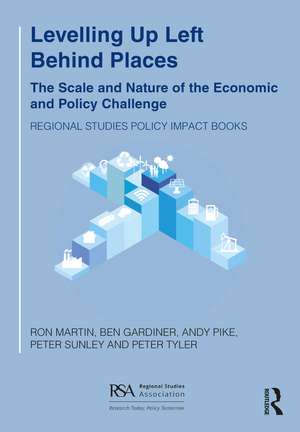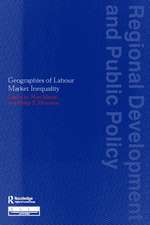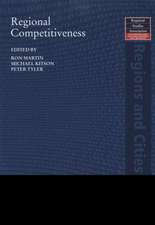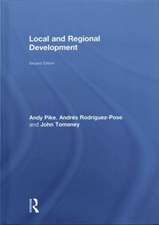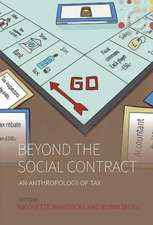Levelling Up Left Behind Places: The Scale and Nature of the Economic and Policy Challenge: Regional Studies Policy Impact Books
Autor Ron Martin, Ben Gardiner, Andy Pike, Peter Sunley, Peter Tyleren Limba Engleză Paperback – 20 dec 2021
Preț: 280.08 lei
Nou
53.60€ • 58.20$ • 45.02£
Carte disponibilă
Livrare economică 01-15 aprilie
Livrare express 18-22 martie pentru 28.31 lei
Specificații
ISBN-10: 1032244305
Pagini: 140
Ilustrații: 12 Tables, color; 34 Line drawings, color; 34 Illustrations, color
Dimensiuni: 174 x 248 x 9 mm
Greutate: 0.34 kg
Ediția:1
Editura: Taylor & Francis
Colecția Routledge
Seria Regional Studies Policy Impact Books
Locul publicării:Oxford, United Kingdom
Notă biografică
Ben Gardiner is a Director and Chief Operating Officer of Cambridge Econometrics (CE), Cambridge, UK. He holds a Doctorate in Economic Geography from the University of Cambridge. His interests are in regional and city economic growth across Europe, regional productivity, and the economic resilience of regions and cities. He has been involved with several ESRC projects on regional and city economic growth and transformation. For several years, he was a Research Associate in the Department of Geography, University of Cambridge, and has also worked for the European Commission (DG JRC-Seville) on their regional ‘RHOMOLO Model’ of Cohesion Funds.
Andy Pike is the Henry Daysh Professor of Regional Development Studies, Newcastle University, UK. From 2012-2017, he was Director of the Centre for Urban and Regional Development Studies (CURDS), Newcastle University. His research interests, publications and research projects are focused on the geographical political economy of local, regional and urban development and policy. He has undertaken research projects for the OECD, UN-ILO, European Commission, UK Government and national, regional and local institutions. He is a Fellow of the Regional Studies Association and a Fellow of the Academy of Social Sciences.
Peter Sunley is Professor of Economic Geography at the University of Southampton, UK. His research has focused on geographies of labour and labour market policy, business clusters and venture capital, design and creative industries, urban development and resilience, and manufacturing in industrial regions. He is a member of the Research Committee of the Regional Studies Association and a Fellow of the Academy of Social Sciences.
Peter Tyler is Emeritus Professor of Urban and Regional Economics at the University of Cambridge, UK, and Emeritus Professorial Fellow of St Catharine’s College, Cambridge, UK. His research interests cover the economics of regions and cities, regional policy and urban planning, with a special focus on public policy impacts. He has directed over 70 regional and urban research projects for the UK Government, many of which have involved the evaluation of flagship policy programmes. He has also been an Expert Advisor to the OECD, the European Commission, and the UK Government, and in 2016 was Expert Advisor to UN Habitat III. Peter is a Member of the Royal Town Planning Institute, a Fellow of the Royal Institute of Chartered Surveyors, and a Fellow of the Academy of Social Sciences.
Recenzii
debate on ‘levelling up’ in the UK. The authors draw upon their long-standing
expertise and understanding to provide a rich and insightful contemporary
analysis of the problem of the UK’s ‘left behind places’. Drawing on robust and
detailed evidence, they present a powerful argument that nothing less than
a transformative shift in policy approach and resource commitment will be
required if the ‘levelling up’ ambition is to be achieved. Whilst this analysis is
focused on the UK, the approach provided and the lessons to be learned have
wider relevance for all countries seeking to reduce spatial divides and develop
greater place-sensitivity in national policy-making.
Gillian Bristow, Professor of Economic Geography, School of Geography and
Planning, Cardiff University, UK
This is a highly recommended book that clearly documents why some places
(cities, towns and localities) in the UK have been left behind economically,
making a convincing case for the role of place-based policies using novel
evidence and analysis and identifying clear radical policy recommendations for
the UK and valuable lessons elsewhere.
Jose Enrique Garcilazo, Head of Regional and Rural Policy Unit, Centre for
Entrepreneurship SMEs, Regions and Cities, OECD
This is a very timely book, dealing with an issue which is becoming urgent in
many countries, i.e. how to help many places currently struggling economically
and socially. Based on solid theory and carefully researched, the book provides
the reader with clear evidence and draws useful and fundamental policy
recommendations, which go beyond the UK context and could have a wider
application in other parts of the world.
Alessandra Faggian, Professor of Applied Economics, Gran Sasso Science
Institute, L’Aquila, Italy
"Since the 1980s, income and employment inequalities between the United Kingdom’s North (including such formerly industrial cities as Manchester and Glasgow) and the South (i.e., including Greater London) have been increasing. The COVID-19 pandemic only served to highlight these inequalities. Although some degree of spatial inequality is inevitable, it does not detract from the importance of minimizing its scale. The book provides valuable guidance on how to reduce these variations in what they call "levelling up left behind places."[…] This 135-page book is easy to read and helps in understanding the predicament of left-behind places and the challenges in leveling them up for economic prosperity." — David Varady (2022) Levelling Up Left Behind Places: The Scale and Nature of the Economic and Policy Challenge, Journal of the American Planning Association,DOI: 10.1080/01944363.2022.2099178
Cuprins
Descriere
This book aims to understand the predicaments of ‘left behind places’ and the scale of the policy challenge of ‘levelling up’ their economic prosperity. Drawing out lessons of wider international significance, it examines how places (cities, towns and localities) have grown apart over recent decades amidst deindustrialisation, post-industrial transition and the disruptive shocks of the global financial crisis and COVID-19 pandemic. Using the UK case to illustrate its arguments, the analysis identifies the different types of ‘left behind places’ and their distinctive economic experiences. The key features of urban and regional institutions and policies are reviewed to understand more about why, despite some successes, geographical inequalities remain an entrenched feature of the UK, blighting the life chances and quality of life of its citizens, and national economic progress as a whole. The weaknesses of past policies are highlighted, and the case is made for a new, mission-oriented policy model, because only a radical shift in economic thinking, governance and management is likely to achieve the ‘levelling up’ that is now a prominent refrain in the political lexicon.
